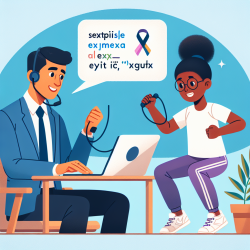Introduction
In the realm of special education, the concept of self-care has often been overlooked, yet it holds significant potential for enhancing both personal well-being and professional effectiveness. Drawing inspiration from the research article "In-person later abortion accompaniment: a feminist collective-facilitated self-care practice in Latin America," this blog explores how special education practitioners can implement similar self-care practices to improve their skills and service delivery.
The Core of Feminist Self-Care Practices
The research article highlights a feminist collective-facilitated self-care model that emphasizes peer support, emotional care, and the empowerment of individuals as the protagonists of their own experiences. This model challenges the notion that self-care is synonymous with solo care. Instead, it promotes a supported self-care approach where individuals are active participants in their care, guided by knowledgeable peers.
Applying Feminist Self-Care in Special Education
Special education practitioners can draw valuable lessons from this model to enhance their professional practices. Here are some ways to implement these concepts:
- Peer Support Networks: Establish networks where educators can share experiences, challenges, and solutions. This fosters a sense of community and provides emotional support, much like the feminist collectives in the study.
- Emotional Care: Prioritize the emotional well-being of both educators and students. Create environments where feelings are validated and addressed, promoting a nurturing atmosphere conducive to learning and growth.
- Empowerment: Encourage educators to take an active role in their professional development and decision-making processes. Provide opportunities for them to lead initiatives and contribute to policy-making, reinforcing their agency.
Addressing Challenges in Special Education
Special education faces unique challenges, such as therapist staffing shortages and legal compliance issues. By integrating feminist self-care practices, practitioners can better navigate these challenges:
- Therapist Shortages: Utilize peer networks to share resources and strategies for managing workloads effectively. Collaborative efforts can alleviate the pressure of staffing shortages.
- Legal Compliance: Empower educators with knowledge and training to ensure they are well-versed in legal requirements. This proactive approach can prevent compliance issues and promote a culture of accountability.
Encouraging Further Research
While the feminist self-care model offers a promising framework, further research is needed to adapt and optimize these practices for special education settings. Practitioners are encouraged to explore how these concepts can be tailored to meet the specific needs of their schools and districts.
Conclusion
Incorporating feminist self-care practices into special education can lead to more supportive, empowering, and effective educational environments. By fostering peer support, emotional care, and empowerment, educators can enhance their professional skills and improve outcomes for students. To explore the original research paper that inspired these insights, please follow this link: In-person later abortion accompaniment: a feminist collective-facilitated self-care practice in Latin America.










